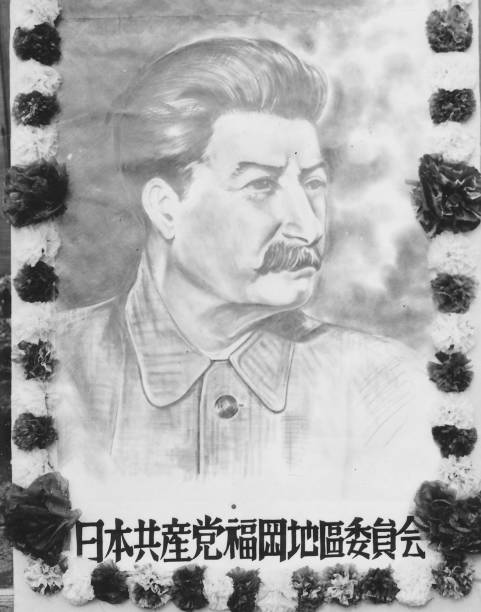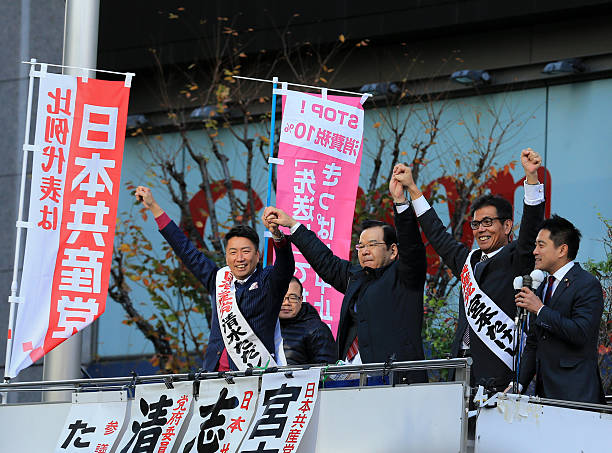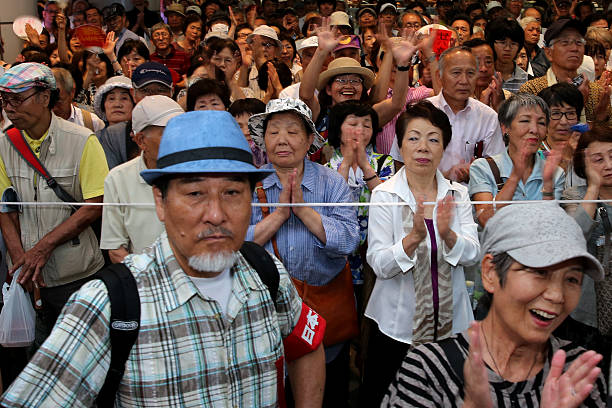The Japanese Communist Party (JCP), known in Japanese as Nihon Kyōsantō (日本共産党), stands as one of the oldest and most enduring communist parties in the world.
Founded in 1922, the JCP has navigated a tumultuous journey, surviving suppression, internal splits, and the changing tides of global communism, all while maintaining a unique ideological stance that has set it apart from its international counterparts.
You can read about communism in Nepal here.

Early Years: The Birth of the JCP
The JCP was established in the early 20th century during a period of significant political and social upheaval in Japan. The aftermath of World War I, coupled with the rise of socialist and communist movements globally, created fertile ground for the emergence of a communist party in Japan. The party’s founders, inspired by the Bolshevik Revolution in Russia, aimed to overthrow the existing capitalist structure in Japan and establish a classless, communist society.

However, the party’s early years were marked by harsh repression. The Japanese government, under the influence of the Meiji Constitution, which favored imperial rule and nationalism, quickly moved to suppress the JCP. The party was forced underground, and many of its leaders were arrested. Despite these challenges, the JCP continued to grow in influence, particularly among intellectuals and workers disillusioned with the existing order.
Post-War Revival: The JCP in the 1940s and 1950s
The end of World War II marked a turning point for the JCP. Japan’s defeat and subsequent occupation by Allied forces led to significant political changes, including the introduction of a new constitution that guaranteed basic civil liberties. These changes allowed the JCP to operate openly for the first time, and the party quickly seized the opportunity to expand its influence.
During this period, the JCP adopted a strategy of working within the democratic framework of the new Japanese state. This marked a significant departure from the party’s earlier revolutionary stance. The JCP began participating in elections, and by the early 1950s, it had secured a number of seats in the Japanese Diet (parliament). The party’s focus shifted towards advocating for social and economic reforms within the existing system, rather than seeking its immediate overthrow.

Ideological Evolution and Splits
The JCP’s ideological journey has been marked by a number of significant shifts, often leading to internal splits and factionalism. One of the most notable splits occurred in the 1950s, in the aftermath of the Sino-Soviet split. As tensions between the Soviet Union and China escalated, the global communist movement was forced to choose sides. The JCP, which had initially aligned itself with the Soviet Union, found itself caught in the middle.
In 1958, the party experienced a major split when a faction led by Nosaka Sanzō, a prominent JCP leader, chose to align with China’s Communist Party, advocating for a more radical approach to revolution. This faction became known as the Japan Revolutionary Communist League (JRCL), and it broke away from the JCP. The split highlighted the growing ideological divisions within the global communist movement and underscored the challenges faced by the JCP in maintaining its unity.
Another significant split occurred in the 1960s, this time over the issue of Japan’s security treaty with the United States. The JCP vehemently opposed the treaty, viewing it as a symbol of Japan’s subordination to American imperialism. However, a faction within the party, known as the New Left, criticized the JCP’s approach as too moderate and called for more direct action against the treaty. This faction eventually broke away to form the Japanese New Left movement, further fragmenting the communist movement in Japan.
Despite these splits, the JCP has managed to maintain its core ideological principles. The party has consistently advocated for the abolition of capitalism, the establishment of a socialist state, and the eventual transition to communism. However, unlike many other communist parties, the JCP has also emphasized the importance of democratic processes and has rejected the use of violence as a means of achieving its goals. This commitment to non-violence and democracy has allowed the JCP to survive in Japan’s political landscape, even as other communist parties around the world have faded into obscurity.
The JCP Today: Balancing Ideals and Pragmatism
In the post-Cold War era, the JCP has continued to evolve, balancing its ideological commitments with the pragmatic realities of modern politics. The party remains a vocal critic of Japan’s close ties with the United States, particularly in terms of military cooperation. It also opposes the presence of U.S. military bases on Japanese soil, arguing that they undermine Japan’s sovereignty and contribute to regional instability.
At the same time, the JCP has broadened its focus to include a wide range of social and economic issues. The party has been a strong advocate for workers’ rights, environmental protection, and social welfare programs. It has also taken a firm stance against nuclear power, particularly in the wake of the Fukushima disaster in 2011. These positions have helped the JCP to attract a diverse base of supporters, including young people and environmentalists who may not necessarily identify as communists but share the party’s concerns about social justice and sustainability.
The JCP’s commitment to democratic principles has also allowed it to maintain a presence in Japan’s political system. The party regularly participates in elections, and while it has never been a major force in the Diet, it has consistently held seats in both the House of Representatives and the House of Councillors. This electoral success, albeit limited, is a testament to the party’s ability to adapt to changing political circumstances while remaining true to its core principles.
Challenges and Criticisms
Despite its resilience, the JCP faces a number of challenges in the contemporary political landscape. One of the most significant is the perception that the party is out of touch with modern realities. Critics argue that the JCP’s adherence to Marxist-Leninist ideology is outdated and irrelevant in a globalized, post-industrial society. The party’s opposition to free-market capitalism and its calls for the abolition of private property are seen by many as impractical, if not outright utopian.
The JCP has also struggled to shake off its association with authoritarian regimes, particularly in China and North Korea. While the party has distanced itself from these regimes and has criticized their human rights records, it remains vulnerable to accusations of ideological inconsistency. This has made it difficult for the JCP to attract mainstream voters, particularly in a country like Japan, where memories of World War II and the subsequent U.S. occupation still loom large.
Conclusion: The JCP’s Enduring Legacy
The Japanese Communist Party is a unique entity in the world of global communism. Its commitment to democratic principles, non-violence, and social justice has allowed it to survive and even thrive in a political environment that has been largely hostile to communist ideology. While the party faces significant challenges, both ideological and practical, it remains an important voice in Japan’s political landscape.
For those interested in exploring the complex history and ideology of the JCP, further reading can be found in the JCP’s official history and in academic analyses such as this study on the evolution of the Japanese left.
As the JCP continues to navigate the challenges of the 21st century, its story serves as a reminder of the enduring appeal of communist ideals, even in the face of overwhelming odds. Whether one agrees with its ideology or not, the JCP’s history is a testament to the power of ideas and the resilience of those who believe in them.
You can check out our Extremes of Japan Tour here.





